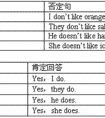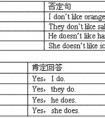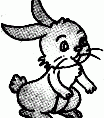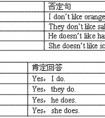句型转换。1. My favourite season is spring.(就画线部分提问) ________________________________________________2. I like to run in spring.(变成一般疑问句) _____-六年级英语
题文
| 句型转换。 |
| 1. My favourite season is spring.(就画线部分提问) ________________________________________________ 2. I like to run in spring.(变成一般疑问句) ________________________________________________ 3. We sing a song.(变成祈使句) ________________________________________________ 4. Winter is my favourite season.(变成一般疑问句) ________________________________________________ 5. Why do you like summer?(自由回答) ________________________________________________ |
答案
| 1. What's your favourite season? 2. Do you like to run in spring? 3. Let's sing a song. 4. Is winter your favourite season? 5. Because I like to sit in the sun.(供参考) |
据专家权威分析,试题“句型转换。1. My favourite season is spring.(就画线部分提问..”主要考查你对 一般疑问句,疑问代词,特殊疑问句,祈使句 等考点的理解。关于这些考点的“档案”如下:
一般疑问句疑问代词特殊疑问句祈使句
考点名称:一般疑问句
- 一般疑问句:
是疑问句的一种。它是以be动词,have或助动词、情态动词开头,用yes(是)或no(否)来回答的句子。
其结构是:系动词be/助动词/情态动词+主语+其他成分
一般疑问句的肯定形式为:
助动词+主语(+实义动词)。肯定答语用“yes+可定结构”。
一般疑问句的否定形式为:
助动词构成的缩写否定词+主语(+实义动词)。否定答语用“no+否定结构”。
例:
— Do you like this story-book? 你喜欢这本故事书吗?
— Yes, I do. 喜欢。/ No, I don’t. 不喜欢。
— Is he a student? 他是一名学生吗?
— Yes, he is. 是,他是。/ No, he isn’t. 不,他不是。 一般疑问句的改写:
一、含有be动词的一般疑问句,通常把be动词调到句首。例如:
陈述句:They are in the swimming pool.
一般疑问句:Are they in the swimming pool?
注意:一般疑问句句末要用“?”。
二、含有情态动词的一般疑问句(can, may...),把情态动词调到句首。例如:
陈述句:He can drive a car.
一般疑问句: Can he drive a car?
三、含有have的一般疑问句,have译为“有”。一般疑问句式有两种形式:
1.把have/has调到句首。例如:
陈述句:Tommy has a computer.
一般疑问句:Has Tommy/he a computer?
2.加助动词do/does,第三人称单数用does,其他人称用do。其句型为:Do/Does + 主语 + have...?
例如上句可变为: Does Tommy have a computer?四、一般动词的一般疑问句,也要借助助动词do/does,第三人称单数用does,其余人称用do。
其句型为:Do/Does + 主语 + 动词原形+其它?
陈述句:Amy speaks English.
一般疑问句:Does Amy speak English?一般疑问句的回答:
首先要有人称的改变。当主语为名词时,在答语中要改成其相应的代词。
另外,答语有两种,肯定的回答(用yes)和否定的回答(用no),否定式常用缩写形式。
现在还是让我们分句型一一说明。一、一般疑问句含be动词时,用be动词回答,句末用句号。例如:
-Is Mary your sister?
-Yes, she is. / No, she isn’t.(缩写)二、一般疑问句含有情态动词(can, may, should等)时,用情态动词回答。例如:
-May I come in?
-Yes, you may. / No, you can’t.三、一般疑问句含有have(译为“有”)时,有两种回答方式。
1.直接用have/has回答。
例如:
-Have they any pictures?
-Yes, they have. / No, they haven’t.
2.用助动词do/does回答。
例如:
-Does Millie smoke?
-Yes, she does. / No, she doesn’t.四、一般动词的一般疑问句回答时也用助动词。
例如:
-Do the workers live in London?
-Yes, they do. / No, they don’t.
考点名称:疑问代词
- 疑问代词:
在句子中用来构成特殊疑问句,主要用于询问“何人”、“何事”、“什么”。
常见的疑问代词如下表所示:
疑问代词
替代范围
who
人
whom
人
whose
人
which
人、事、物
what
事、物
考点名称:特殊疑问句
- 特殊疑问句:
以特殊疑问词开头,对句中某一成分提问的句子叫特殊疑问句。
常用的疑问词有:what、who、whose、which、when、where、how、why等。
特殊疑问句往往是就其中的某一成分,进行提问,而且根据情况直接回答,不能用yes或no简单回答。
常见的疑问代词有who, whose, which, what;疑问副词有when, where, why, how。
例:What do you do on Sunday? 你周日的时候干什么?
Which class are you in? 你在哪个班?
Where does Mr. Li live? 李先生住在哪?
Why are you late? 你为什么迟到? 特殊疑问句的构成:
一、 特殊的疑问词。
特殊疑问句要由疑问代词或疑问副词开头,询问的内容不同, 使用的疑问词也不同。
我们学过的疑问词有:
what(询问事物), how much(询问价格),what time (询问时间,尤其是点钟), what kind of(询问种类),why(询问原因),who(询问人), where(询问地点) 等等。如:
—What is this? 这是什么?
—It's a key. 这是一把钥匙。
—How much is it? 这个多少钱?
—It's twenty dollars. 二十美元。
—What kind of movies do you like? 你喜欢哪一类型的电影?
—I like action movies. 我喜欢动作片。
二、特殊的语序。
特殊疑问句由疑问词开头,其构成是“疑问词 + 一般疑问句”。如:
What time is it? 现在几点钟?
Who is your teacher? 谁是你的老师?
三、特殊的答语。
特殊疑问句不能用yes, no来回答,而应根据它所询问的内容直接做出回答才行。如:
— What time is it, please? 请问几点了?
— It's 7:30. 七点半了。
— Where are they? 他们在哪儿?
—They're in the playground. 他们在操场上。
—What's your favorite subject? 你最喜爱的科目是什么?
—English. 英语。
四、 特殊的语调。
一般情况下,特殊疑问句要用降调(↘)来读。如:
Who's ↘that?
How old is↘Jack?特殊疑问句有两种语序:
1.如疑问词作主语或主语的定语,即对主语或主语的定语提问,其语序是陈述句的语序:
- 最新内容
- 相关内容
- 网友推荐
- 图文推荐
| [家长教育] 孩子为什么会和父母感情疏离? (2019-07-14) |
| [教师分享] 给远方姐姐的一封信 (2018-11-07) |
| [教师分享] 伸缩门 (2018-11-07) |
| [教师分享] 回家乡 (2018-11-07) |
| [教师分享] 是风味也是人间 (2018-11-07) |
| [教师分享] 一句格言的启示 (2018-11-07) |
| [教师分享] 无规矩不成方圆 (2018-11-07) |
| [教师分享] 第十届全国教育名家论坛有感(二) (2018-11-07) |
| [教师分享] 贪玩的小狗 (2018-11-07) |
| [教师分享] 未命名文章 (2018-11-07) |





![____ it got four wheels?[ ]A. Have B. There C. Has-五年级英语](http://www.00-edu.com/d/file/ks/4/1/65/2019-08-31/small2ca0aeba76320ba6f81e40fe83a0e8111567199443.png)
